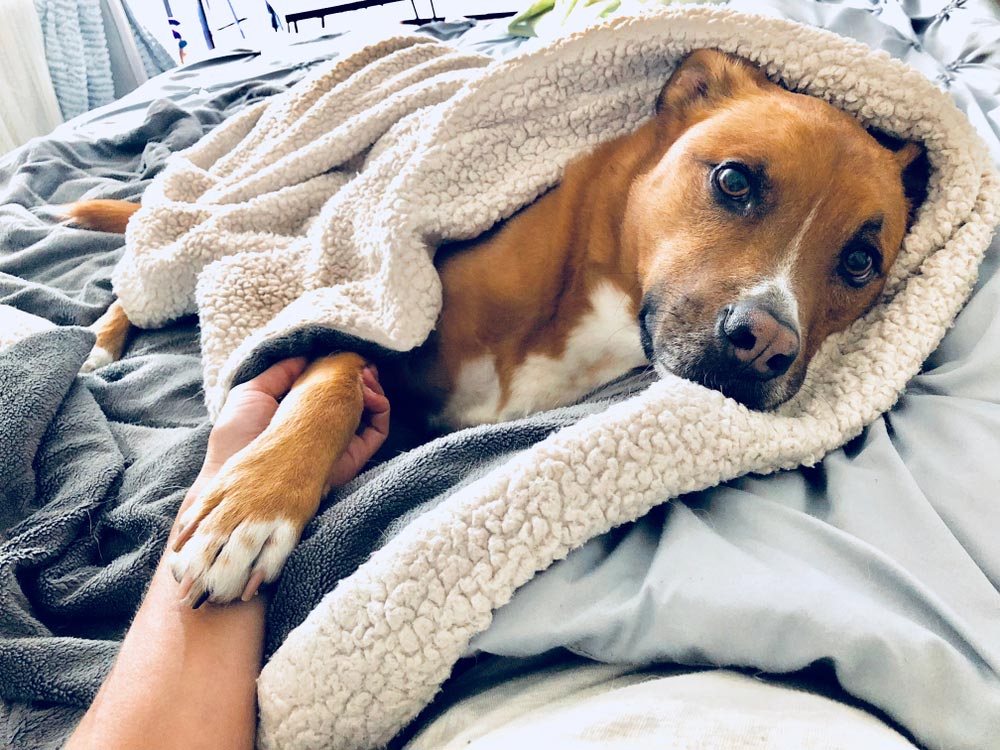Emergency help now
Coffs Harbour (02) 6651 2477 • Woolgoolga (02) 6654 2771 • Nambucca Heads (02) 5522 1030. After-hours emergency care is available. If you suspect poisoning, call us right away. You can also call the Animal Poisons Helpline 1300 869 738 for free, evidence-based advice while you are on the way.

Why minutes matter
Curious dogs and everyday hazards are a risky mix. From cane toads and rat bait to xylitol in sugar-free products, many toxins can cause life-threatening problems very quickly. Rapid veterinary assessment and treatment often make the difference, so please call as soon as you see or suspect an ingestion. The Animal Poisons Helpline exists to support owners and vets with up-to-date, case-specific guidance.
- Move your dog away from the toxin and keep them quiet and warm.
- Call Blue & White on the numbers above for instructions; bring product packaging or a photo if you have it.
- Do not give food, milk, charcoal or home remedies, and do not induce vomiting unless a vet or the Animal Poisons Helpline tells you to. Some substances cause more harm if vomited.
- If cane toad contact is suspected: wipe the gums and tongue repeatedly with a damp cloth for 10–15 minutes to remove toxin residue, and head straight to the clinic. Do not hose water down the throat as this can cause aspiration.
8 red-flag signs your dog needs a vet now
If any of these signs appear after a known or suspected exposure, leave for the clinic immediately and call us on the way.
1) Repeated vomiting or diarrhoea (especially with blood)
Frequent vomiting or diarrhoea can follow many toxins and leads to dehydration and shock. Blood in vomit or stools is urgent.
2) Collapse, sudden weakness or wobbliness
This can occur with severe toxicity or with xylitol-related low blood sugar; prompt treatment is critical.
3) Seizures, tremors or muscle twitching
Seen with cane toad toxin, some baits, mouldy foods and medications. Seizures require emergency care.
4) Trouble breathing or blue-tinged gums
Respiratory or cardiac involvement needs oxygen and rapid intervention.
5) Excess drooling, pawing at the mouth or oral irritation
Common with caustic products, some plants and cane toads. Treat as urgent, especially if neurologic signs follow.
6) Unusual bruising, bleeding or black stools
Classic signs of rat-bait (anticoagulant) poisoning; bleeding may appear days after ingestion—do not wait.
7) Severe lethargy, disorientation or fainting
May indicate low blood sugar (xylitol), liver involvement or shock. Immediate assessment is needed.
8) Reduced or no urination after vomiting
Possible kidney injury (for example, from some foods and medications) or severe dehydration; urgent fluids and tests may be required.
Common toxins we see on the Mid North Coast
- Cane toads – drooling, shaking, seizures; wipe the mouth thoroughly with a damp cloth and come straight in. Never force water down the throat.
- Rat and mouse baits – internal bleeding can take 2–7 days to show; early treatment is very effective.
- Xylitol (sugar-free gum, lollies, toothpaste) – causes dangerous low blood sugar and possible liver injury.
- Macadamia nuts – vomiting, weakness, tremors and fever are typical; most cases recover with supportive care but still need assessment.
- Human pain relievers and household chemicals – ibuprofen, paracetamol, cleaners and caustics can be very dangerous; call before giving anything at home.
How we help at Blue & White
At our Coffs Harbour, Woolgoolga and Nambucca Heads clinics we can:
- Triage and stabilise on arrival, with oxygen, temperature control and seizure care where needed.
- Decontaminate safely when appropriate, and start IV fluids, anti-nausea medicine and pain relief.
- Run blood and urine tests, monitor blood glucose for xylitol exposures, and check clotting if rat bait is suspected.
- Provide hospitalisation and monitoring with tailored treatment plans and follow-up phone checks. We also offer after-hours emergency care.
Frequently Asked Questions
Should I wait for symptoms before calling
No. Early advice improves outcomes. If you saw or strongly suspect an ingestion, call us or the Animal Poisons Helpline now.
Can I make my dog vomit at home?
Only if a vet or the Animal Poisons Helpline instructs you. Vomiting is dangerous with caustics, hydrocarbons and in dogs that are weak, disoriented or already vomiting.
What should I bring to the clinic?
Product packaging or a photo of the label, an estimate of how much and when, and any vomited material in a sealed bag if you have it.
Is there someone I can call for advice while I drive?
Yes. The Animal Poisons Helpline 1300 869 738 provides free, evidence-based guidance for Australian pet owners.



